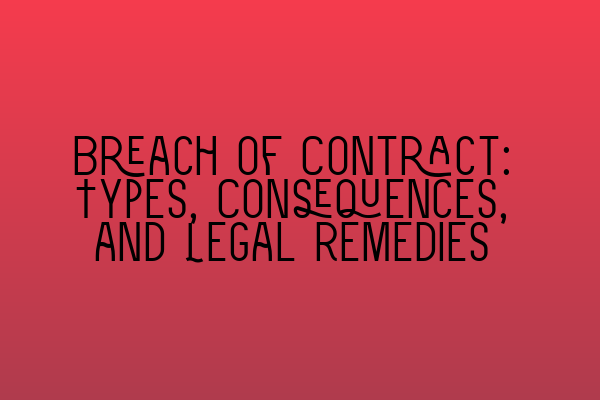Breach of Contract: Types, Consequences, and Legal Remedies
Contracts play a fundamental role in business transactions and personal agreements, providing essential protection and ensuring that all parties involved fulfill their obligations. However, there are times when one party fails to uphold their end of the bargain, resulting in a breach of contract. This can lead to a plethora of complications and legal issues that require immediate attention and resolution.
In this article, we will delve into the various types of contract breaches, the potential consequences for both parties, and the legal remedies available to the injured party. Whether you are a business owner, freelancer, or simply navigating personal agreements, understanding breach of contract is crucial to protecting your rights and interests.
Types of Contract Breaches
Before diving into the consequences of a breach of contract, it is essential to understand the different types of breaches that can occur:
- Material Breach: A material breach occurs when one party fails to perform a significant obligation outlined in the contract. This breach is considered serious and goes to the heart of the agreement, causing significant harm to the non-breaching party.
- Minor Breach: Unlike a material breach, a minor breach is a non-serious violation that does not significantly impact the overall agreement or cause substantial harm. Despite being less severe, the non-breaching party still has legal options to address the breach.
- Anticipatory Breach: An anticipatory breach is when one party explicitly or implicitly indicates that they will not fulfill their contractual obligations in the future. This breach allows the non-breaching party to seek legal remedies immediately, instead of waiting for the actual breach to occur.
- Actual Breach: An actual breach refers to a situation where one party has failed to perform their obligations as outlined in the contract. This can include failure to deliver goods or services, failure to pay on time, or any other violation of the agreed-upon terms.
Each type of breach has its own implications, and the appropriate response will depend on the specific circumstances and the seriousness of the breach.
Consequences of a Breach of Contract
When a breach of contract occurs, it can have wide-ranging consequences for both the breaching and non-breaching party:
- Financial Losses: Depending on the nature of the breach, the non-breaching party may suffer significant financial losses. This can include the cost of finding an alternative supplier, reimbursing customers for undelivered goods or services, or even pursuing legal action to recover damages.
- Damaged Reputation: Breach of contract can tarnish a party’s reputation, especially if the breach occurs in a highly visible business transaction. Word spreads quickly, and the damaged reputation may adversely affect future business opportunities and relationships.
- Lack of Trust: Contract breaches can erode trust between parties, making it difficult to engage in future agreements or collaborations. The non-breaching party may become skeptical of entering into contracts, leading to missed opportunities for both parties.
- Legal Action: In some cases, the non-breaching party may choose to pursue legal action to enforce the contract or seek compensation for their losses. This can result in costly court proceedings, legal fees, and a significant amount of time and effort.
It is crucial to understand the potential consequences of a breach of contract and consider the best course of action to protect your interests and achieve a favorable resolution.
Legal Remedies for Breach of Contract
When faced with a breach of contract, the non-breaching party has several legal remedies available to seek compensation or enforce the terms of the agreement:
- Monetary Damages: The most common legal remedy is the award of monetary damages. The non-breaching party can seek compensation for any financial losses incurred as a result of the breach, including direct damages, consequential damages, and sometimes even punitive damages.
- Specific Performance: In certain situations, the injured party may request specific performance, which means that the breaching party must fulfill their contractual obligations as outlined in the agreement. Specific performance is typically sought when the subject matter of the contract is unique or when monetary damages would not be sufficient to remedy the breach.
- Rescission: Rescission involves canceling the contract and restoring the parties to their pre-contract positions. This remedy is usually pursued when the breach is so substantial that it nullifies the entire agreement.
- Reformation: Reformation allows the court to modify the terms of the contract to reflect the original intent of the parties. This remedy is commonly used when the contract contains mistakes or ambiguities that led to the breach.
Choosing the appropriate legal remedy depends on the circumstances, the available evidence, and the desired outcome. Seeking legal advice from a qualified solicitor is strongly recommended to navigate the complexities of contract law and ensure the best possible resolution.
Conclusion
Breach of contract can have significant consequences, ranging from financial losses to damaged reputation and strained business relationships. Understanding the different types of breaches, the potential consequences, and the legal remedies available is essential for protecting your rights and minimizing the negative impacts of a breach.
Remember, prevention is always better than cure. Drafting a clear and comprehensive contract, conducting due diligence before entering into agreements, and seeking legal advice from experienced solicitors can help mitigate the risk of breach and safeguard your interests.
If you want to learn more about contract law or prepare for the SQE exams, check out our related articles:
- SQE 1 Practice Exam Questions
- SQE 1 Practice Mocks FLK1 FLK2
- SQE 2 Preparation Courses
- SQE 1 Preparation Courses
- SRA SQE Exam Dates
Stay informed, protect your rights, and ensure your contracts are solid to avoid the headaches and complexities of breach of contract.
